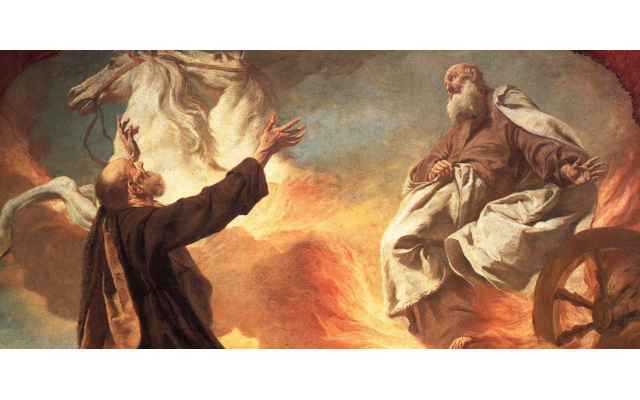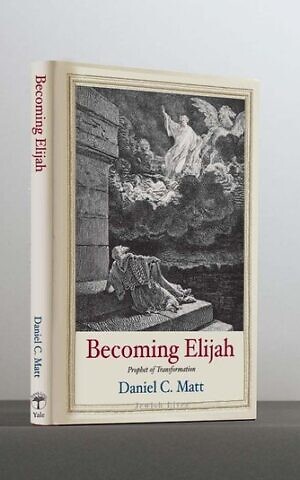New Book Examines Elijah’s Historical Transformation
Author Daniel Matt sees the Jewish Biblical prophet as an example of personal transformation.
Daniel C. Matt’s latest book, “Becoming Elijah: Prophet of Transformation,” arrives just as we set our Passover table to welcome the biblical prophet. The book, which was published last month as part of the prizewinning Jewish Lives series from Yale University Press, considers how the role of Elijah has changed over the centuries, from a zealous figure of judgment to one of compassion.

Matt is best known for his monumental nine-volume annotated translation of the Pritzker Edition of the “Zohar,” a foundational text of Jewish mysticism. The project, which was completed over an 18-year period, has been hailed as a monumental contribution to the history of Jewish thought and scholarship.
The AJT spoke to Matt about prophetic zeal, the destruction of the Second Temple and how Elijah became perhaps the most familial figure in all of Jewish tradition.
AJT: How is Elijah seen in the Bible?
Matt: He is violent in a way, in the Bible. He is not the perfect human being. His story covers about seven chapters. There’s the contest with the prophets of the old and then his death wish when he finds out that Jezebel wants to kill him. In the Bible, he is very much a loner. No one knows when he’s going to appear or disappear. No family is described. There is no wife, no children. He spends most of his time on his own unless he is confronting someone. On occasion, he has great compassion, but he certainly comes across in the Bible as a zealous prophet. But that’s only the beginning of this story.

AJT: That’s not how he’s seen today. We don’t think, when we open the door for him at our Seder, that this violent prophet will charge in.
Matt: No, of course not. He’s the most popular figure in all of Jewish folklore. No one comes close; not King David or Moses or Solomon. But he’s also the source of the most esoteric secret cryptic teachings in Judaism, the Kabbalah. He’s depicted as inspiring the first Kabbalah. There’s a tradition that the “Zohar” was written in a cave by Rabbi Shimon, the son of Yochai, and that he was inspired to write it by Elijah. But again, Elijah bridges that. He is this popular folkloric hero, and then he’s the one who inspires the mystics.
AJT: How did he come to be this beloved figure?
Matt: That’s due to his transformation within our religious tradition. I think that’s the most significant thing about Elijah. You could call it a tikkun, a Hebrew word meaning a repair or a mending. In a sense, he mends his ways. He learns. He learns how to love. He learns how to feel compassion.
AJT: How did this radical transformation occur?
Matt: Many feel that the rabbis of the Talmud and the Midrash are responsible for this. They see this fiery figure and they’re somewhat suspicious about zealots, because they know that the Second Temple was destroyed partly because of the zealots in Jerusalem. They turn him into a more compassionate figure. So, you could see it that way, but you could also say that Elijah is doing this to himself, somehow, over the ages. He’s not just the historical person who lived in the 9th century BCE; he takes on another life. It’s as if somehow he feels a need for this tikkun, and that happens gradually, over centuries. You could say he goes from seeing everything in black and white, like he is in the Bible, and then in the Talmud he’s able to say both this and that are words of the living G-d. He is able to see the possibility of different points of view, of different approaches to religion. So I think Elijah gradually learns to appreciate the variety of approaches to God and to existence.
AJT: So what is the lesson we learn from Elijah about this transformation?
Matt: What we learn is that he is able somehow to transform that rage into compassion. And I think that’s what’s so valuable for us to see, to see it as a model of how we can go deep within ourselves and find the things that are missing, find the shattered parts of ourselves and bring about a tikkun because Elijah did that and can inspire us to be transformed.
AJT: And what has this transformation meant to how he has been integrated into Jewish tradition?
Matt: He has become the most familial figure. Not only do we set a place for him at the Seder table, with the hope that he will announce the coming of the messiah, but he’s there every Saturday evening. He’s part of the ritual of Havdalah that completes the Shabbat. His name is invoked three times a day by an observant Jew in the grace after meals. Finally, he’s at every bris where this innocent, nameless baby boy is welcomed into the Jewish fold. There’s that moment of transition in the baby’s life and in the family’s life and it’s marked by Elijah. So, he’s a part of all these changes, all these transformations. He has been integrated into the Jewish family.
Daniel Matt teaches The Zohar and Jewish mysticism online. More information is available at www.sup.org/zohar/course.



comments